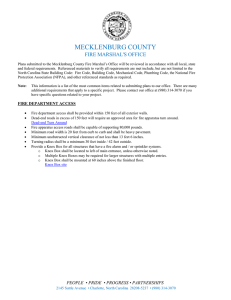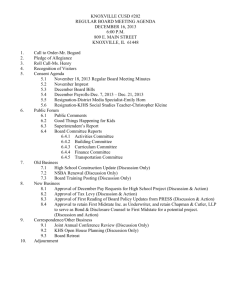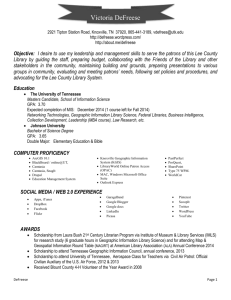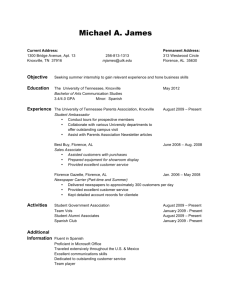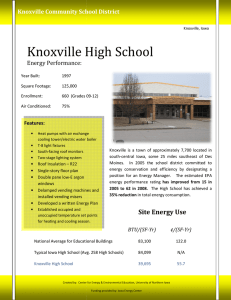August 26, 2009 Joe Walsh Director
advertisement
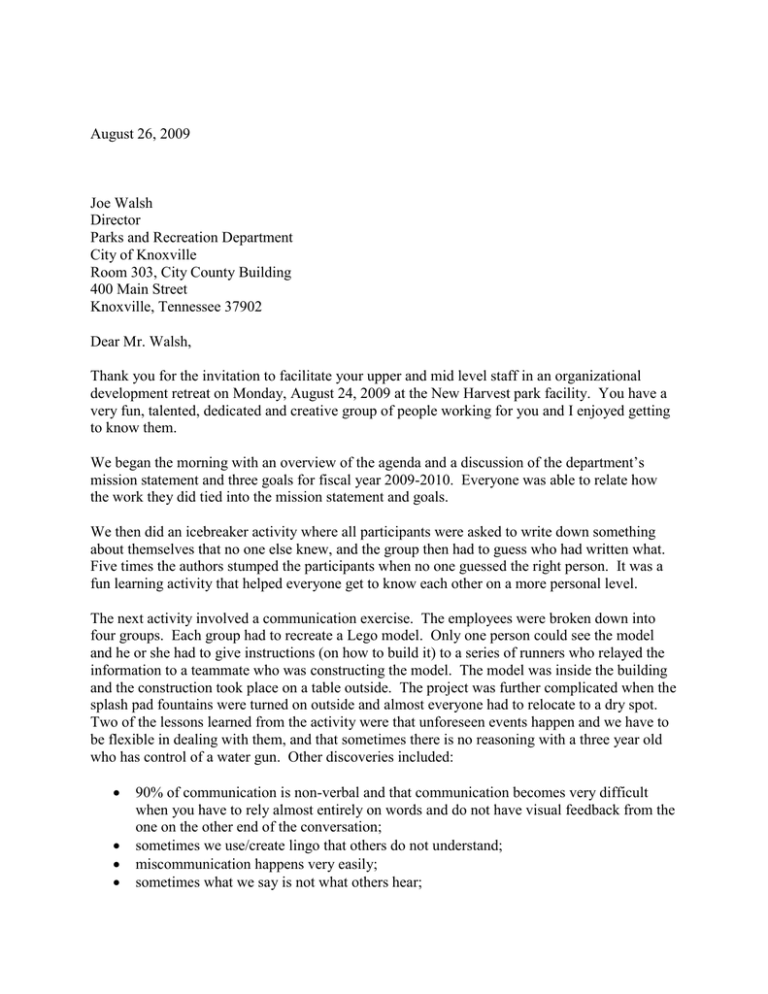
August 26, 2009 Joe Walsh Director Parks and Recreation Department City of Knoxville Room 303, City County Building 400 Main Street Knoxville, Tennessee 37902 Dear Mr. Walsh, Thank you for the invitation to facilitate your upper and mid level staff in an organizational development retreat on Monday, August 24, 2009 at the New Harvest park facility. You have a very fun, talented, dedicated and creative group of people working for you and I enjoyed getting to know them. We began the morning with an overview of the agenda and a discussion of the department’s mission statement and three goals for fiscal year 2009-2010. Everyone was able to relate how the work they did tied into the mission statement and goals. We then did an icebreaker activity where all participants were asked to write down something about themselves that no one else knew, and the group then had to guess who had written what. Five times the authors stumped the participants when no one guessed the right person. It was a fun learning activity that helped everyone get to know each other on a more personal level. The next activity involved a communication exercise. The employees were broken down into four groups. Each group had to recreate a Lego model. Only one person could see the model and he or she had to give instructions (on how to build it) to a series of runners who relayed the information to a teammate who was constructing the model. The model was inside the building and the construction took place on a table outside. The project was further complicated when the splash pad fountains were turned on outside and almost everyone had to relocate to a dry spot. Two of the lessons learned from the activity were that unforeseen events happen and we have to be flexible in dealing with them, and that sometimes there is no reasoning with a three year old who has control of a water gun. Other discoveries included: 90% of communication is non-verbal and that communication becomes very difficult when you have to rely almost entirely on words and do not have visual feedback from the one on the other end of the conversation; sometimes we use/create lingo that others do not understand; miscommunication happens very easily; sometimes what we say is not what others hear; people respond to the same instructions in different ways; there are cultural and upbringing differences that impact our interactions; sometimes when we get frustrated and do not understand something we just make a best guess and go do our own thing; once a mistake has been made in a direction, the path you are on will probably never veer back on course because you build on top of that mistake; perhaps discussing a strategy as a team in the beginning would have ended with better results; you have to know the skill set of the person you are communicating with and adjust your message accordingly; some people can handle vague instructions and others need precise/step by step guidance; and sometimes the outcome is better than what we originally envisioned even though it is different than what we expected. From here the discussion turned to how the exercise related to everyone’s job. We talked about email; trying to communicate with non English speaking citizens; when it is appropriate to pick up the phone or have a face to face interaction versus email; the significance of all capital letters in email; explanation point usage; how to know when someone understands what you have just said; working with different cultures; adequate personal space when having conversations; and the formality levels associated with varying forms of written communication. At this point, we took a break for a brief lunch and then came back for a presentation of the department’s website and webpages and the importance of having current and correct information. The presentation and discussion was led by Public Affairs Specialist Kathleen Gibi. To get minds prepared for the next exercise, participants worked on 20 exceptionally difficult brainteaser questions. They worked individually first. Working solo, the percent of correct answers averaged 12%. Then staff was allowed to work with their coworkers seated at the table with them. The average of correct answers then rose to 31%. That number rose dramatically when everyone collaborated and shared their answers. The point of the exercise was to demonstrate that by working together better results can be achieved. This led right into a discussion on partnerships. One of the goals for the fiscal year is to establish viable partnerships with organizations, agencies, groups and individuals to enhance and expand recreational opportunities and objectives. Taking turns everyone identified at least one partner. The lengthy list of partners is as follows: Recreation Commission U.S. Army Home School Groups American Red Cross Knox Co. Internal Audit Knox Co. Health Department Community Action Committee Amateur Athletic Union User Friendly Maps Knox Co. GIS Knoxville Utility Board Senior Aides Knox Metro Football Coca Cola Bush Brothers Mission of Hope Children’s Hospital Knoxville Community Development Corp. TN. Department of Transportation Ijams Nature Center Churches Knoxville Area Transit State of Tennessee University of Tennessee Transportation Planning Organization/Metro. Planning Commission MTAS Knox Co. Parks and Recreation Knox Co. Schools Knoxville News-Sentinel Radio/TV/Media Knoxmoms.Com. Public Building Authority TN Valley Authority Mays Bus Line Knoxville Track Club Knox Co. Libraries Knoxville Tourism & Sports Corporation Chili’s Knox Greenway Coalition Knox Bike Coalition PetSafe Pilot Oil Fort Loudon Lake Association Blue Cross/Blue Shield Knox Co. Air Quality Greater Knoxville Tennis Association When employees gave a name of a partner, the question was asked: What do they help you with/do? The responses fell into one of many categories listed below: Certifications Monetary Donations Individual Programming Combined Programming Food/Snacks Advertising Volunteers/Personnel Humor and Moral Support Revenue Source Grant Administration Equipment Donation Materials Land Maintenance Research Facilities Expertise Management Distribution Advocacy Political Support Next, a list was generated of some of the issues that can be worked on to improve the relationships with the sponsors. That list included: Sometimes it feels like there is more give than take Lack of loyalty Reductions in funding Restrictions/strings attached to funding or donations Application process is sometimes complicated We need to set the rules up front so that both groups have the same expectations The timing of the delivery of the money/good/service is not always what is needed Turnover at the donor’s agency makes it difficult to establish rapport and to follow through with commitments Miscommunications Trust Mismatch at onset Lack of fulfillment of promised or pledged items After that, we focused on the positives, and talked about the characteristics of the best partner relationships. Participants offered the following: They give us lots of ideas They are dependable We share common goals Their agency has a desire for success We have good communication They are accountable The agency is community minded They have a sense of pride We both have an understanding of each other and what they can do The organization has a lot of energy The agency has a lot of enthusiasm The partner has sufficient manpower There is a key contact or a project manager that we work with who is someone who can handle questions and problems There is support from the top of the organization We have shared ethics They have adequate resources Commitment There is a low demand on the city from the relationship Subsequently, the conversation migrated toward what the department can do to enhance or expand its partnerships. The responses were: Project generation Start with idea, then find funding Find commonality Be aware of what others are doing – outside city/state and copy when appropriate Piggyback on efforts with other agencies Ask for help with publicity Revisit past successes and try to duplicate Communicate with neighborhood groups Conduct surveys Finally, the afternoon came to an end and a wrap up ensued. The concluding remarks included that good communication is critical for successes with our citizens, clients, and partners and that by working together the department can better achieve its goals and mission. The last request of the day was for each person to share one item that they learned or found interesting over the course of the day. Even after a long day, everyone shared a story or tidbit. Again, I truly appreciate the opportunity to work with you and your staff. I hope that the retreat met your objectives and that your staff went back to work on Tuesday thinking of new or improved ways to approach their jobs. Thank you for allowing MTAS to be of service to the Knoxville Parks and Recreation Department. Sincerely, Margaret Norris Municipal Management Consultant One thing about yourself that no one else knows… I like to play guitar – Mike I was voted most improved bowler my senior year of college – Chris I have a passion for music (especially oldies), and have started a dee-jay business doing weddings, holiday parties and special events. I am also left handed and proud – Nikki I was into hard rock in middle school and high school – Stefanie I have an absolute passion for country music – Leonard* Skill set: Conduct beauty pageant – Lynn* I attended 5 different elementary schools growing up – Joe* I was born 2 months premature – Randy I held the Olympic torch – Kathleen Went to Eastport Elementary school – Norman I was president of the Kappa League in high school – Vinnie When I was a KID, I beat up a handicapped kid – Kristin As a child, I had flaming red curly hair. My niece thought I was a girl when she saw my baby photos – Harold Someone in my family is adopted – Beth* Nature lover. Wanna be farmer – Cathy* I was in Berlin when the “Wall” came down – Maria My Dad was an undercover narcotics agent – Karen I was a finalist in a national contest – Valerie * Denotes that no one correctly guessed who the author was.

